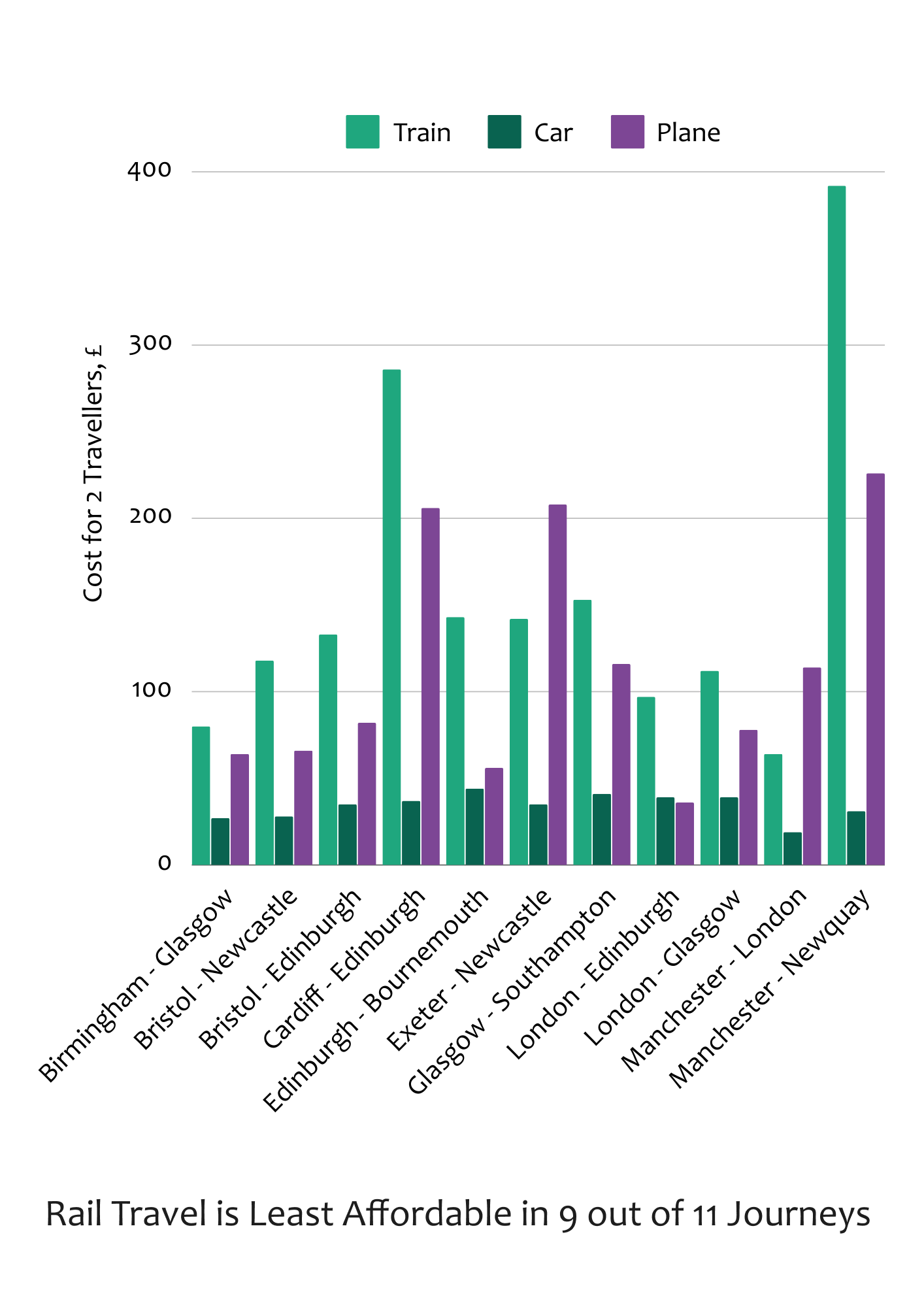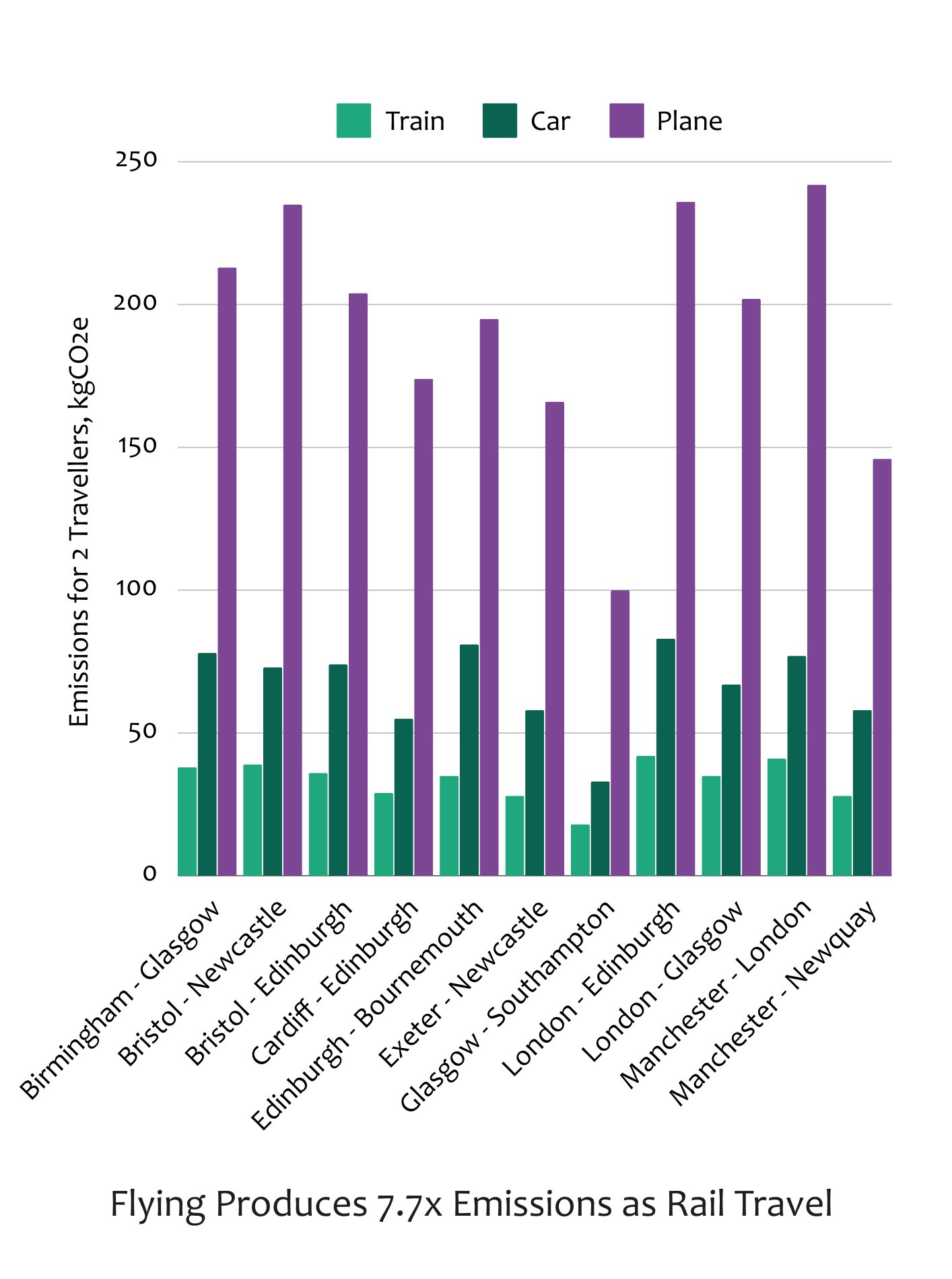With rail fares rising by a significant 4.9% in March 2024, many commuters and travellers in the UK are seeking more cost-effective methods of transport. While alternatives like driving can be better for the wallet, it’s much worse for the planet. The public isn’t to blame, however. The ever-rising costs of rail fares simply no longer justify travelling via train for many travellers and commuters.
In this article, we’ll explore the true financial and environmental costs of travelling in the UK and discuss how business owners can make commuting more sustainable for employees.
To find out the true carbon impact of UK travel and how much people are spending, Innovative Energy Consultants analysed 11 journeys to major cities in the UK and compared the financial and environmental costs of travelling via car, train, and plane for two people.
Key findings:
Our research reveals that the average journey between cities in the UK costs £34.19 in petrol for two people and £156.38 for two train tickets. This means travelling via train is 358% more expensive than driving a car.
For 9 out of 11 journeys analysed, flying is more affordable than taking the train. Shockingly, flying is 37% cheaper on average than travelling via rail, with two plane tickets costing £114 and two train tickets costing £156.38. For a more detailed overview of cost comparisons, see the graph below:

For two colleagues taking all 11 journeys together, flying would add 2.8 tonnes of CO2e to their company’s Scope 3 emissions, compared to taking the train which would result in just 0.37 tonnes of CO2e of Scope 3 emissions – making flying 7.7 times as polluting as train travel.
On average, travelling via train emits 33 kgCO2e* for two passengers while driving produces 100 kgCO2e of emissions – meaning cars produce almost triple the amount of greenhouse gas emissions.

It's really no surprise that employees are looking for more affordable commuting options, given that taking the train is 358% more expensive than driving. With employees less likely to choose sustainable travel options due to rising rail fares, businesses can help combat this by implementing sustainable travel incentives.
From shuttle buses to cycling schemes, here are some of the most impactful incentives we’ve seen our clients use to reduce their Scope 3 emissions and protect the environment whilst promoting employee wellbeing.
Remote working and working from home policies cut the commute completely, eliminating any carbon emissions that would have otherwise been produced by employees making their way to work. This is why businesses that are still able to operate with employees working from home or remotely should consider implementing flexible working policies.
Not only does this cut the amount of carbon emissions polluting the planet, but it also reduces the stress of commuting, saves time, and can provide your employees with a better work/life balance.
Businesses that are unable to operate without their staff on the premises can always offer flexible working options instead. Offering flexible working hours allows employees to stagger their commutes and purchase cheaper off-peak tickets or cycle during quieter times. Offering flexible working hours can also help reduce the overall time spent commuting and decrease the stress of travelling during busy hours.
Flexible and remote working options have become the norm, with 71% of UK workers viewing a flexible working pattern as important when considering a new role. Additionally, 69% say the ability to work remotely is important. Businesses that offer flexible working options are more likely to attract a wider talent pool and retain staff as well as keep Scope 3 emissions low.
Offering a zero-interest season ticket loan is a great way to help make commuting by train cheaper. Businesses should also offer as much information about train and bus routes and schedules as possible to encourage employees to take methods of transport that are better for the environment.
If your place of business is not within walking distance of a train or bus stop, consider introducing a shuttle service. Corporate shuttle services operating between the workplace and transit hubs or residential areas make it easier for employees to ditch their cars. Shuttles make the commute easier, more affordable, and better for the environment.
Introducing a cycle-to-work scheme is a fantastic way of reducing greenhouse gases, increasing the health and well-being of your employees, and reducing tax payments. Electric bikes are also included in the scheme, making cycling a practical option for those living further away from work.
In terms of how it works, businesses provide employees with a voucher to buy cycling equipment. The business reclaims the value of this voucher in 12 monthly instalments from the employee's pre-tax salary. As well as helping spread the cost, this scheme reduces employee's National Insurance and Income Tax. The business saves on Employers’ National Insurance and reduces their Scope 3 emissions. It’s a simple win-win!
We’ve spoken to a surprising number of people who would love to cycle to work, but worry about being sweaty and uncomfortable in the office. Providing showers, changing facilities and even hair dryers removes this barrier. Another common concern is that bicycles will be stolen, so we recommend that businesses install dedicated cycling racks in secure areas, such as the existing parking facilities, to eliminate this worry.
Depending on where your employees live in regards to your business, public transport or cycling may not always be the best option. So, you should consider promoting car sharing as a way to help your employees save money and reduce carbon emissions. To encourage employees to participate, organisations can create internal platforms to help them find others willing to car share. Businesses can further support car-sharing policies by offering prime parking locations for car-share vehicles and rewards such as entry to a monthly raffle.
By encouraging employees to take sustainable commuting options, your business will actively support a more sustainable future. If you’re still not sure where to start, don’t worry! Innovative Energy Consultants provides businesses with actionable advice on how to become more sustainable. Drop us a line and book a free 15-minute consultation call.
*CO2e or Carbon Dioxide equivalent is a way of measuring the global warming potential of all Greenhouse Gas emissions in a single number. For example, Methane has 25 times the global warming potential of Carbon Dioxide, so emissions of 1 kg of Methane are 25 kgCO2e.
Methodology
Data sources

In June 2023, the EU Regulation on Deforestation-free Products, or EUDR, was written into law. From December 30th, 2025 businesses selling commodities linked to deforestation to customers in the EU will be required by this law to prove that they have not contributed to new deforestation or forest degradation. Read on to find out if your business needs to comply with EUDR.